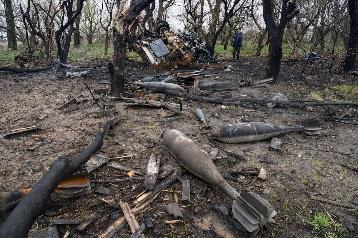
Illicit trade and associated criminal activities are estimated to account for between 8 and 15 per cent of global GDP (OECD). A significant proportion of the trafficking in illicit goods and contraband can be traced to a small number of supply routes, safe haven hubs that specialize in illegal manufacturing, diversion, and/or cross-border smuggling while also serving as money laundering centers.
In 2022-2024 the Hubs of Illicit Trade Project Team (HIT 1) analyzed four established hubs of illicit trade with the goal of:
- Building an evidence-based picture of selected hubs of illicit trade and their impacts.
- Mobilizing stakeholders toward collective action to counter illicit trade and related corruption and money-laundering.
- Recommending actions to strengthen governance and cross-border law enforcement cooperation to investigate and disrupt the illicit activities in these hubs.
- Informing the business community of the financial and reputational risks of working in illicit trade hubs.
Project Output
Hubs of Illicit Trade: Project Summary
Dubai: A Global Hub for Illicit Trade and Sanctions Evasion
Regional Hubs of Illicit Trade in Central America: Panama, Belize and Guatemala
Regional Hubs of Illicit Trade: Ukraine
Regional Hubs of Illicit Trade: The Tri-Border Area. (Paraguay, Argentina and Brazil)
Centros regionales de comercio ilícito en Centroamérica: Panamá, Belice y Guatemala
HUBS OF ILLICIT TRADE IN THE GLOBAL ECONOMY, an academic volume edited by Dr Yulia Krylova and published by Routledge Publishers in September 2024 is also a product of the HIT team’s research. It is available on Amazon
Mapping the Global Ecosystem of Illicit Trade
The team has now embarked on a new project to map the global ecosystem of illicit trade. Our goals are to:
- Provide a data-driven basis for improved international collaboration to counter illicit trade.
- Clarify the roles that different hubs play in this system.
- Help identify the hubs with global links that are most important to the system and need further analysis.
- Identify nodes where interventions should be concentrated.
- Help local law enforcement better understand the international roles and connections of their local jurisdictions.
- Shed light on ways that illicit trade networks interact with each other, and with legitimate commerce.
- Identify new hubs that have emerged as a result of changed political or economic circumstances.
Presentation on the Tri-Border area (in Portuguese)
See Mirian Gasparin’s press release about HIT entitled, “Estudo Revela Preocupação Com Os Impactos Do Comércio Ilícito Global,” which mentions the project’s work on the Tri-Border area.
March 7, 2023
Disrupting Hubs of Illicit Trade: Policy Recommendations and Industry Solutions
This virtual event was the third in a series of webinars from the Hubs of Illicit Trade (HIT) project that focuses on four hotspots (Dubai, Central America, the Argentina-Brazil-Paraguay tri-border area, and Ukraine) and different types of illicit trades, including natural resources, counterfeits, excise goods, drugs, arms, and human trafficking. Not only does illicit trade have enormous impacts on government revenues and the well-being of society, but it also negatively affects legitimate businesses across all industries and sectors. This panel discussion launched a multi-sector dialogue to address criminal convergence and commonalities across hubs of illicit trade. A new cross-sector approach is critical for disrupting these hubs by tackling their interconnected nature and finding points of convergence between the most affected industries. The webinar panelists discussed their innovative cross-cutting work in this area, focusing on best practices, industry solutions, and good examples of joint initiatives to combat illicit trade. This discussion also provided new insights into policy recommendations and helped enhance our understanding of the common issues and challenges facing the public and private sectors. Addressing these issues together is key to effectively disrupt hubs of illicit trades at the global and regional levels.
Speakers
Monica Ramirez: Global Director, Corporate Affairs, Regulatory and Public Policy
Jerry Cook: VP Government and Trade Relations, HanesBrands, Inc.
Adrian Cheek: Threat Researcher and former UK Law Enforcement Officer
David Luna: Founder, International Coalition Against Illicit Economies; CoDirector, Anti-Illicit Trade Institute (AITI), TraCCC (moderator)
Layla Hashemi, PhD: Postdoctoral Research Fellow, TraCCC (moderator)
Click here for the video
Click here for the slide deck
November 30, 2022
Crime Convergence and the Enabling Environment
Across today’s economies, supply chains, and online marketplaces, illicit trade remains a pernicious threat that has enormous costs for governments, businesses, and communities. A significant proportion of the trafficking in illicit goods and contraband can be traced to an interlinked network of routes, financial safe havens, and trade hubs that not only enable illicit economies, corruption, and money laundering, but also help fuel greater insecurity and instability across borders. Based on our new research on illicit trade hubs in Dubai, Central America, and the Tri-Border Area (Brazil/Argentina/Paraguay), this event used case studies to examine the impacts of crime convergence and the enabling environment on the facilitation of illicit trade and new criminal threats that multiply harms across regions.
Speakers
- Dr. Christian Vianna de Azevedo: Under Secretary of Justice and Public Security for Intelligence, Joint Operations and Integration, Department of Justice and Public Security in the State of Minas Gerais – Brazil
- Daniel Rico: Founder and General Director, C-Análisis
- Dr. Rashmi Singh: Associate Professor, PUC Minas, Brazil; co-founder and co-director, Research Network on Terrorism, Radicalization and Transnational Crime (TRAC); Coordinator, Laboratory for Research and Projects in International Relations, PUC Minas
- Dr. Yulia Krylova: Research Scholar, TraCCC; Data Analyst, World Bank Group
- Jorge Lasmar (moderator): Dean of Post-Graduate Studies, Professor of International Law, Faculdades Milton Campos, Brazil (Moderator)
- Dr. Jorge Lasmar (moderator): Professor, PUC Minas, Brazil; co-founder and co-director TRAC; CEO Agama BT; Director of Legal Affairs of the International Association for Security and Intelligence Studies (INASIS), Regional Coordinator of the Terrorism Research Network (TRI)
June 14, 2022
Hubs of Illicit Trade: Project Launch
TraCCC held a meeting for the launch of a new project, Hubs of Illicit Trade, which seeks to better understand illicit trade, and the hubs that represent an outsized portion of that activity. Dr. Louise Shelley led our global team of experts and researchers in a discussion of the issue and this exciting project. Among the questions we hope to answer with this project are:
WHY are hubs of illicit trade becoming an increasing security concern across the international community?
WHAT are the driving factors? What are the key sectors?
WHO are the enablers? What are their tools?
WHAT has been the impact of COVID and the explosion of E-commerce? Corruption? The war in Ukraine and other violent conflicts?
And most important of all: What can we do about it? What are the right policies to counter the global enablers of hubs of illicit trade?


